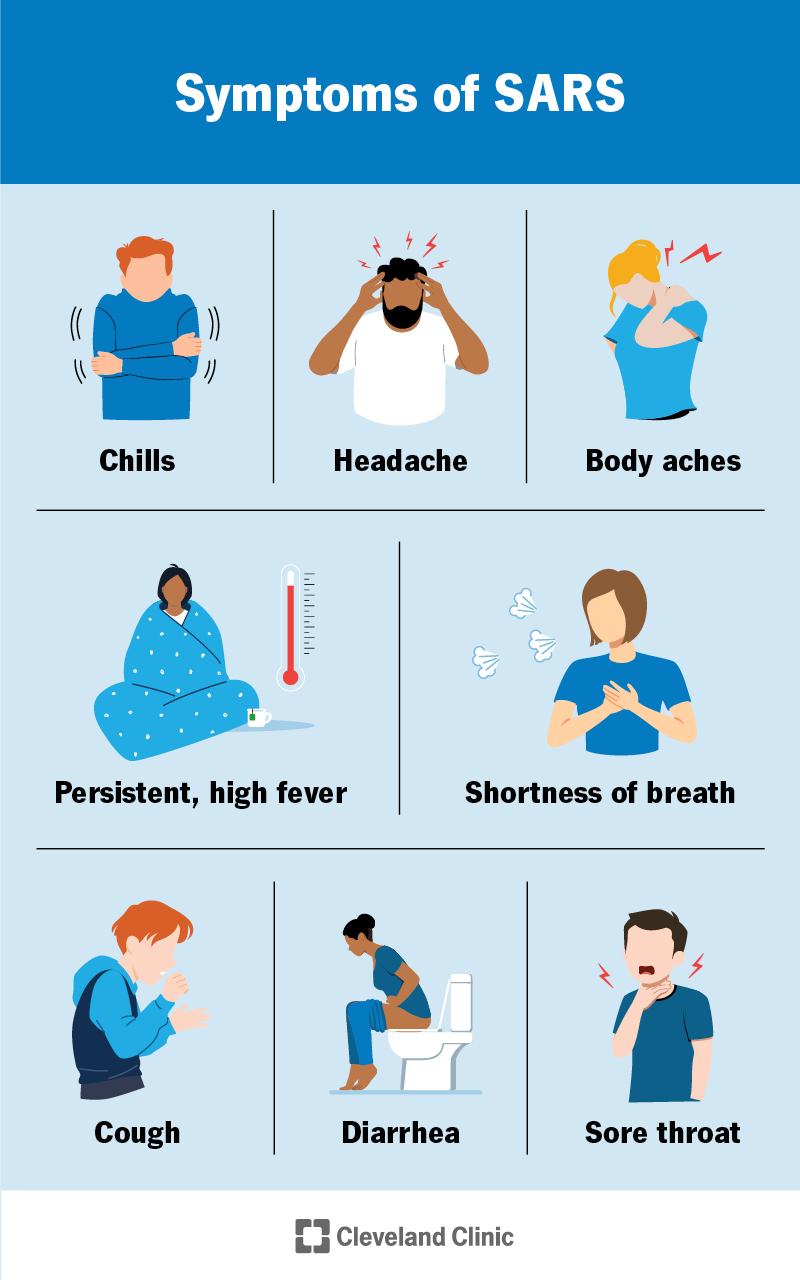Severe acute respiratory syndrome (SARS) was a respiratory illness caused by the virus SARS-CoV-1. It caused an outbreak of severe illness in several countries between 2002 and 2003. Symptoms included high fever, cough and shortness of breath. No cases have been reported since 2004.
Advertisement
Cleveland Clinic is a non-profit academic medical center. Advertising on our site helps support our mission. We do not endorse non-Cleveland Clinic products or services. Policy

Image content: This image is available to view online.
View image online (https://my.clevelandclinic.org/-/scassets/images/org/health/articles/sars)
SARS (SARS-CoV-1) was a respiratory illness that spread in many countries around the world in 2002 and 2003. For many people, SARS caused flu-like symptoms (like fever and headache). But it progressed to severe illness in about 1 to 2 out of every 10 people (10% to 20%) during the outbreak.
Advertisement
Cleveland Clinic is a non-profit academic medical center. Advertising on our site helps support our mission. We do not endorse non-Cleveland Clinic products or services. Policy
More than 8,000 people in 29 countries had SARS between 2002 and 2003. There was a small outbreak related to occupational exposure in 2004. Preventive measures stopped its spread, and only nine people were infected. There haven’t been any reported cases since then.
Symptoms of SARS include:
Some people only have a fever and other flu-like symptoms. Others develop a cough and shortness of breath two to seven days after their initial symptoms started.
A virus, SARS-associated coronavirus (SARS-CoV-1), causes SARS. Viruses are small pieces of genetic material (DNA or RNA) enclosed in a protective coating. They use your cells’ machinery to make more copies of themselves, which makes you sick.
SARS spreads through respiratory droplets, usually when someone with the virus coughs or sneezes. You can also get it by touching contaminated surfaces. Surfaces can become contaminated when someone with the virus coughs or sneezes on them or touches them without washing their hands.
SARS no longer spreads. But during the 2002-2003 epidemic, some people had mild illness and others had severe complications, like:
Advertisement
People who were severely ill were put on mechanical ventilation if they couldn’t breathe on their own.
People with mild symptoms could treat themselves with pain relievers and fever reducers — much the same way you’d take care of yourself with a cold or the flu.
No, there isn’t a cure for SARS. And like many viruses, there aren’t any specific antiviral medications that treat it.
In general, you can reduce the risk of spreading viruses (like SARS) and other infectious diseases by:
At the end of the SARS epidemic in 2003, 916 people had died from the disease. One person died during a small outbreak in 2004.
No, COVID-19 and SARS are different illnesses caused by different viruses. They’re both respiratory illnesses caused by coronaviruses, which is why the viruses have similar names (SARS-CoV-1 and SARS-CoV-2). Coronaviruses can also cause mild respiratory illnesses, like common colds.
COVID-19 spreads more easily and has infected far more people than SARS did. COVID-19 also seems to spread more easily before symptoms start (in SARS, people were most contagious after symptoms started).
Public health measures helped contain SARS. Scientists collaborated to quickly identify and find ways to test for the virus. SARS is most contagious after symptoms start, so screening people with symptoms and isolating them at home was effective at containing the spread.
Outbreaks of any illness can cause uncertainty and anxiety. SARS caused mild and severe illness and hundreds of deaths. But cooperation among scientists, healthcare providers and members of the affected communities helped limit the number of people who got sick. Health officials across multiple countries were able to work quickly to identify the virus and contain its spread. There haven’t been cases of SARS since 2004.
Advertisement

Sign up for our Health Essentials emails for expert guidance on nutrition, fitness, sleep, skin care and more.
Learn more about the Health Library and our editorial process.
Cleveland Clinic’s health articles are based on evidence-backed information and review by medical professionals to ensure accuracy, reliability and up-to-date clinical standards.
Cleveland Clinic’s health articles are based on evidence-backed information and review by medical professionals to ensure accuracy, reliability and up-to-date clinical standards.
Have a virus, fungus or bacteria? Some of these “bugs” won’t go away on their own. Cleveland Clinic’s infectious disease experts are here to help.
